Small Business SEO Tips

Hand off the toughest tasks in SEO, PPC, and content without compromising quality
Explore ServicesSmall business owners have a lot to think about when it comes to online marketing.
But with the right SEO know-how, you can increase traffic to your business’s website and boost your bottom line.
To help you do so, here we detail 11 easy-to-follow small business SEO tips.
11 Small Business SEO Tips (that work)
As a small business owner, you know that it takes a lot of hard work and dedication to make your company successful.
You may also know that SEO is an important part of growing your business.
But what are the best ways to optimize your website for search engines?
To really set your small business search engine optimization on fire, check out these SEO-boosting pointers.
1. Nail down technical SEO
Alongside optimizing the basics, nailing down the fundamentals of technical SEO can help small businesses level the playing field and compete more effectively for organic search traffic.
Just so you know, technical SEO covers a wide range of factors, including website structure, site speed, and the use of schema markup.
And why are these factors important?
Well, ensuring that your website is technically optimized will better your chances of ranking higher in search engine results pages (SERPs), drive more website visitors, and convert more of those visitors into customers.
For a surefire way of improving your technical SEO game, here are some examples of technical aspects you can improve on your website:
- Create a sitemap and submit it to Google. Sitemaps are an XML file that informs Google about the pages on a website. This helps web crawlers better index a website and determine its relevance to a user’s search term.
- Prune old pages that don’t perform. A super effective method of improving the performance of a website is to remove old, unused web pages that’s either not ranking or no longer converting.
- Fix broken and old links. Broken and old external and internal links can create a frustrating user experience, as well as affect a website’s SEO efforts. To improve your site’s standings with search engines, be sure to fix linking issues.
- Optimize your images. Images can be optimized for use on the web by reducing their file size without affecting the quality of the image. This ensures an image loads quickly on both desktop and mobile devices.
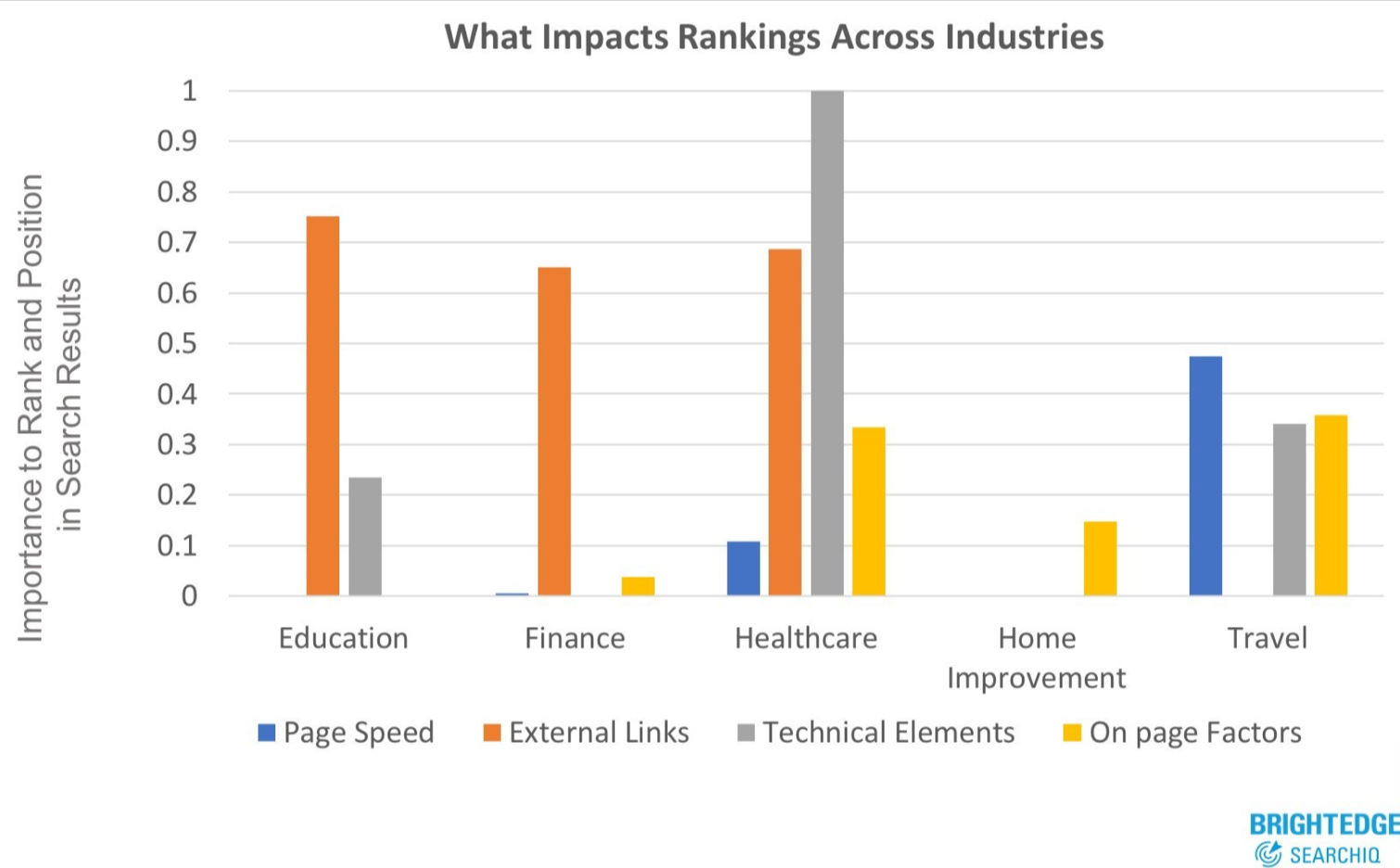
To really hit home how important technical SEO is, BrightEdge found that, for the top 5 industries, technical SEO plays a crucial role in the rank and position websites will experience on the SERPs.
2. Focus on Local SEO
When local businesses focus on local SEO, they are placing an emphasis on tactics that will help them rank higher in local search results.
This can include practices like optimizing their Google My Business profile, creating localized content, and securing positive reviews from customers.
Additionally, small business owners can also improve their local SEO standings by making sure that their website’s title tags and landing pages are correctly optimized for local search and that the business is listed in local directories like Google Places and Bing Places.
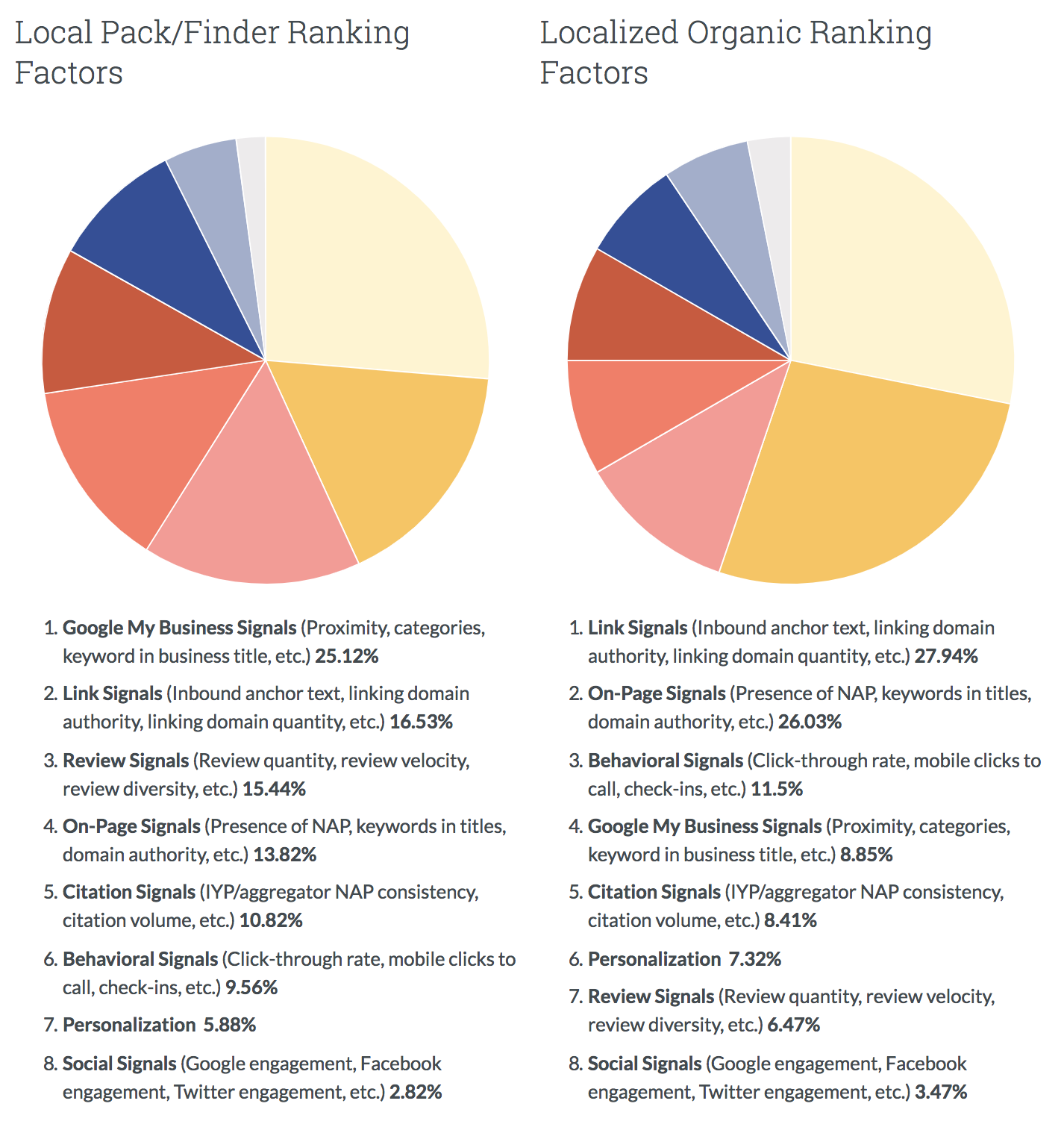
Further, according to Moz, the most impactful local search ranking factors break down like this. GMB signals, link signals, reviews, and on-page SEO efforts being the most potent.
By carrying out these basic local SEO practices, small business owners can ensure their business will be found by a great number of potential customers.
3. Find the right keywords (aka terms customers are searching)
There are endless amounts of keyword opportunities out there, but to signal to search engines where your business’s specialities and expertise lie, it’s best to target keywords that will give your site the best chance of attracting targeted traffic.
When a person arrives at a website through a targeted advertisement or search engine result, they are more likely to be interested in the product or service being offered and are therefore more likely to convert.
Relevance is key when it comes to online marketing, and targeting users with relevant content – focused on niche specific keywords – is one of the most effective ways to ensure your business will be prioritized in the SERPs.
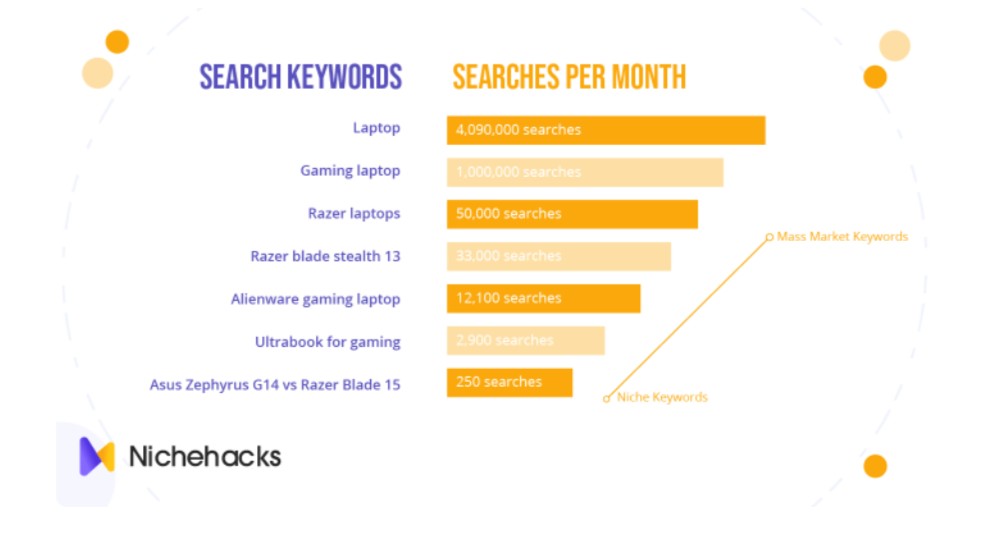
You can see an example of niche keywords above.
Simply targeting the keyword “laptop” may give your website the opportunity to bring in a ton of website traffic, but the competition for this search term is guaranteed to be extremely competitive.
Instead, by targeting a niche keyword like “Asus Zephyrus G14 vs Razer Blade 15” you’re seriously increasing the chances of positioning your content at the top of the SERPs.
Sure, the search volume is much lower, but your chances of bringing in a high-proportion of the traffic for this term is much, much higher than generic, high-competition keywords.
4. Optimize your On-page SEO
On-page SEO is the practice of optimizing a website’s content and structure to improve its ranking on the SERPs.
This includes both the content of individual pages and how the website is structured overall.
On-page SEO can be accomplished through a variety of techniques, including:
- Optimize page titles and headlines. Page titles and headlines should be written in a way that accurately describes the content of the page, is optimized for SEO search terms, while also enticing readers to learn more.
- Use appropriate header tags. Header tags should be used to identify the key topics of your website’s content. They should be used in order from H1 (the most important) to H6 (the least important).
- Clean up your meta tags. Meta tags are important for search engine optimization. They allow search engines to understand what your page is about so it can be ranked appropriately in search results.
- Leverage SEO tools. There are a variety of SEO tools available to help boost search rankings. Use keyword research tools to find the right keywords to target, and use SEO optimization tools to help improve your website’s standings with Google’s algorithmic requirements.
5. Focus on your unique offerings
By emphasizing what makes your business different, you can attract attention from potential customers who are looking for something specific and unique.
You can do this by offering different products or services, or by providing more information or a better user experience than your competitors. This will help you stand out from the competition and attract new customers.
This ties in well with niche-specific keywords.
If your business brings something new to the market – and the SERPs -, you will boost the chances of your business’s success.
6. Build links to your site
One of the most effective ways to boost a site’s credibility in the eyes of search engine algorithms is to build a comprehensive backlink profile – preferably composed of outbound links from high domain authority websites.
A small business’s website will need a strong backlink profile in order to compete with larger businesses. Quality links from high-quality websites will help to improve a website’s ranking, relevancy, and online visibility.
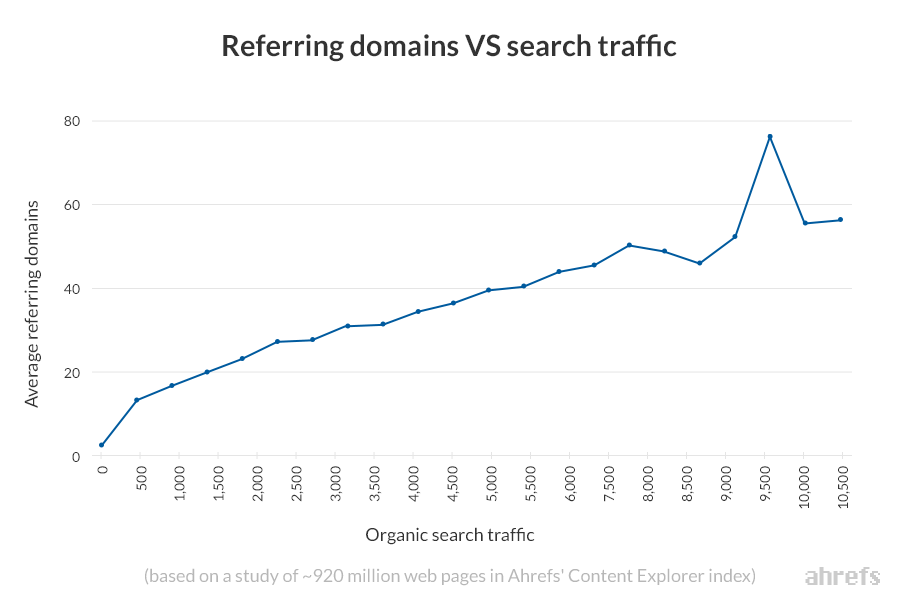
You can see here in this example from Ahrefs, the more referring domains a website has pointing outbound links to its site – a.k.a backlinks – the more search traffic it will receive.
When link building, here are some tactics you can use:
- Guest post on related, authoritative blogs.
- Post to forums, Q&A, and social bookmarking websites.
- Create valuable, informative, and share worthy content.
- Get backlinks from press releases and article directories.
7. Publish high-quality content (and lots of it)
If you want your small business website to rank well on the SERPs, you’ll want to publish high-quality content on a regular basis.
Sure, search engines love fresh content, but simply churning out blog posts for the sake of it won’t help. Instead, do your keyword research and come up with topics that your audience is actually interested in reading about.
Of course, simply publishing high-quality content isn’t enough – you also need to promote new content if you want it to perform well.
Content can be promoted by emailing it to subscribers, syndicating it on high-authority domains, and including it in a weekly or monthly newsletter.
And don’t forget about long-tail keywords – these can be a great way to attract traffic from people who are specifically looking for information about your industry or business niche.
8. Get social
Businesses of all sizes can reap the benefits of social media. For small businesses, it can be an effective way to generate leads and conversions, and to improve their SEO strategy.
Social media platforms are a great way to connect with potential customers.
You can share your company’s story, showcase your products and services, and engage with customers. This all helps to build brand awareness and trust.
Social media also provides an opportunity to target local customers. You can use location-based targeting tools to reach people in specific areas.
9. Make sure your website is user-friendly
Small businesses often overlook the importance of the on-site user experience. Therefore, making your website easy to use is crucial for driving organic traffic and reducing bounce rates.
There are several things small businesses can do to make their website more user-friendly:
- Make sure your website is optimized for mobile. Over 50% of all web traffic now comes from mobile, so it’s super important that your website is responsive on all devices.
- Optimize your website for search engines. Make sure you include relevant keywords in your titles and meta descriptions, and use good SEO practices to improve your rankings in the SERPs.
- Improve the usability of your website. Use clear and concise text, easy-to-navigate menus, and simple forms.
- Build an easily navigated linking structure. Internal links aren’t just to keep search engine algorithms happy, they also provide website visitors with a user-friendly experience.
10. Measure results
Website metrics are also integral to the success of a small business website.
This includes the monitoring of page speed, which can affect your search rankings, and digital marketing efforts, including content marketing.
Additionally, tracking a website’s performance can help identify any problems early on so they can be fixed before they cause any long-term damage.
Every small business should be tracking the performance of their website. Here are three ways to do that:
- Google Analytics. Use Google Analytics to measure website traffic. This will tell you how many people are visiting your site, where they are coming from, and what pages they are visiting.
- GSC. Use Google Search Console to measure how your website is performing in search engine results pages. This will tell you which keywords are driving traffic to your site, as well as any errors that Google is finding on your site.
- SEO tools. Use credible SEO tools like Moz or SEMrush to track how your website is performing in local search results. This will tell you how often your business appears in local search results and grant you access to actionable insights that you can use to further improve the authority and relevancy of your website.
11. Be patient
It’s no secret that small businesses have to work harder than their larger counterparts in order to get noticed.
This is especially true when it comes to SEO.
A recent study by Backlinko found that the vast majority of organic traffic (75 percent) comes from the top five positions on the SERPs.
This emphasizes the need for small business owners to focus on earning those top spots through a combination of high-quality content, backlinks, and citations.
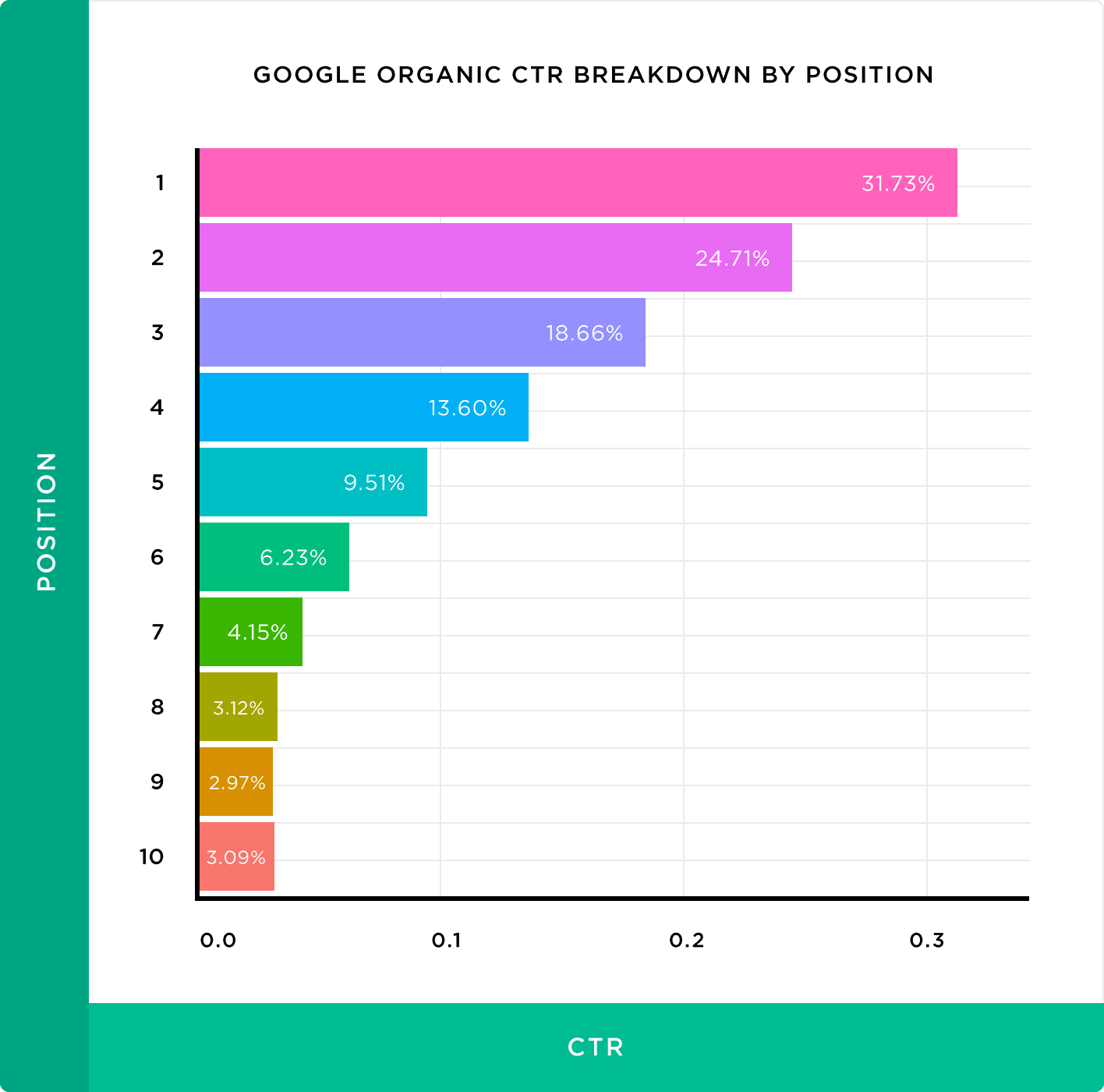
One of the best ways to improve a local site’s ranking is by optimizing for business listings.
Make sure your business name, address, and phone number (NAP) are accurate and consistent across all directories. Also, be sure to include a detailed description of your business and add keywords that accurately describe where your business’s specialities lie.
Summary
Adopting some or all of these tips will help your business to grow and reach its online marketing goals.
But to really make your small business’s SEO efforts pop, understand there are many helpful services available to make the process easier. Loganix offers affordable SEO services that will allow your business to achieve better search engine rankings and increase website traffic.
Contact us today to learn more about how we can help you grow your business online.
Hand off the toughest tasks in SEO, PPC, and content without compromising quality
Explore ServicesWritten by Aaron Haynes on April 29, 2022
CEO and partner at Loganix, I believe in taking what you do best and sharing it with the world in the most transparent and powerful way possible. If I am not running the business, I am neck deep in client SEO.





